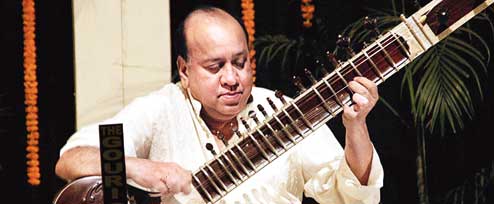
May 29: Subroto Roy Chowdhury, the sitar player who could form a bridge between Indian and western traditions, passed away on May 22 in Berlin. He was 75.
Born in Calcutta in 1942, Roy Chowdhury started learning sitar at the age of 14 under the guidance of Nirmal Chakraborty.
His music training under the ancient Vedic traditions and his missionary schooling struck a unified chord in his psyche. Not a fusion in its commonly used sense but a true union of Vedic philosophies and western reasoning. This remained the pre-dominant tone in his music.
Roy Chowdhury took a few steps back to the more classical age of Indian music. He came into close contact with great teachers of yester-years like Pandit Birendra Kishore Roy Chowdhury and Ustad Hafiz Ali Khan.
Under the influence of Birendra Kishore, the alap and jod became Roy Chowdhury's personal favourites. Alap and jod are slow meditative raag elaborations, and this shows how Roy Chowdhury was walking away from the music that was in vogue in his time.
Eventually, Roy Chowdhury became a "ganda bandhan" shagird of Ustad Aminuddin Khan Dagar, the famous Dhrupad singer. Later, he received training from greats like Pdt Radhika Mohan Maitra and briefly from Pdt Bimal Mukherjee.
Subroto's music resembled 19th century sitar traditions. Smooth Veena Meend Ang and Rababi bol banis were his forte.
After performing in Calcutta and winning several awards, Roy Chowdhury set foot in Europe. The 1970s saw him performing in several radio stations of England, France, Belgium, Switzerland and Germany.
He was the first Indian sitar player after Pdt Ravi Shankar to play in Germany. His first album was released by India Archive Music. Roy Chowdhury was the first Indian to be appointed a guest professor in the World Music Department of Berlin University. He was invited to quite a few jazz festivals and performed with the great soprano saxophonist Steve Lacey. His fusion album, Exploration, is popular till date.
Roy Chowdhury worked with students at studios in Calcutta, New York and Berlin. The Subroto School of Music attracted students from all over the world. His book, The Sound of Sitar, was published by Thema.
Roy Chowdhury is survived by his wife Uma, daughter Sohini, son-in-law Sudipto and grandson Rishi.










